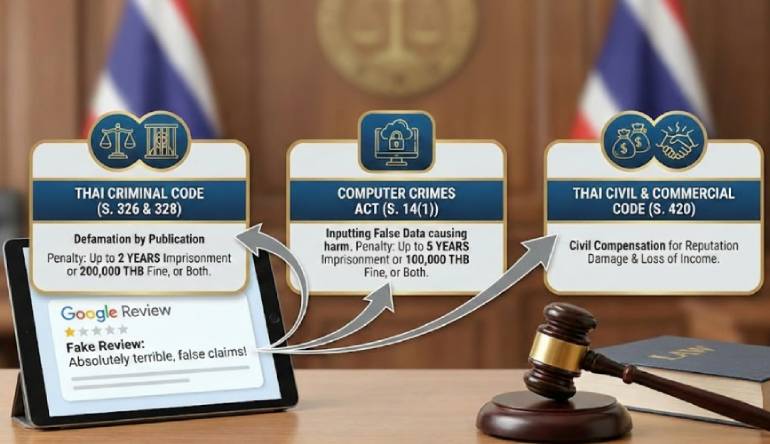In the modern business landscape, online visibility can make or break your brand. For professionals in law, healthcare, hospitality, and other high-trust industries, your Google Business Profile is often the first point of contact with a potential client. A single negative review, whether legitimate or fake, can significantly damage not just your reputation, but also your bottom line. It’s even more troubling when a bad review is posted out of malice, misinformation, or manipulation—especially if you operate in a legal or highly regulated field where professional credibility is paramount.
Many business owners in Thailand, especially law firms, medical clinics, aesthetic practices, and wellness centers, have found themselves under siege due to fake or defamatory Google reviews. Often, these reviews come from disgruntled former clients, ex-employees, competitors, or even anonymous accounts. And while some may think posting a review is protected by the right to freedom of expression, there are clear legal boundaries—particularly in Thailand—where such expression may constitute criminal defamation, a violation of the Computer Crimes Act, or even grounds for civil damages.
In this article, Pimlegal outlines the legal remedies available in Thailand when your business has been impacted by a fake or defamatory review. We also explore the distinction between bad and fake reviews, how to handle them professionally and legally, and when to escalate to law enforcement or litigation.
Understanding the Legal Nature of Google Reviews in Thailand
Under Thai law, freedom of expression is recognized—but it is not absolute. Comments or content that are false and damage another person’s reputation may fall under Section 326–328 of the Thai Criminal Code and Section 14(1) of the Computer Crimes Act B.E. 2550 (2007).
Section 326 of the Criminal Code defines defamation as:
“Whoever, imputes anything to another person before a third person in a manner likely to impair that person’s reputation or expose such person to hatred or scorn, is said to commit defamation and shall be punished with imprisonment not exceeding one year or a fine not exceeding 20,000 Baht, or both.”
Section 328 elevates the severity of the offense when it is conducted through public dissemination, such as an online Google review:
“If the defamation is committed by means of publication, such as writing, drawings, or through media accessible by the public, the offender shall be punished with imprisonment not exceeding two years or a fine not exceeding 200,000 Baht, or both.”
Meanwhile, Section 14(1) of the Computer Crimes Act further criminalizes the act of entering false information into a computer system:
“Any person who inputs into a computer system false data in a manner that causes harm to another person or the public shall be subject to imprisonment not exceeding five years, or a fine not exceeding 100,000 Baht, or both.”
In the context of a fake Google review, these laws may apply simultaneously. That is, the reviewer may face both criminal prosecution for defamation and criminal liability under cybercrime law. In addition to this, the affected business may pursue civil compensation under Section 420 of the Thai Civil and Commercial Code for damage to reputation and loss of income.

Distinguishing Between a Bad Review and a Fake Review
In a functioning democracy, consumers have the right to share their experiences with businesses. If a client had a poor experience and they describe it truthfully—even if unflattering—it is not defamation. These are considered “bad reviews” and, though unpleasant, they typically fall within the boundaries of lawful opinion.
On the other hand, a fake review involves statements that are intentionally false, misleading, or posted by someone who never interacted with the business at all. Fake reviews are often intended to manipulate a company’s online reputation for malicious purposes. They can also include:
- Reviews by competitors pretending to be clients
- Reviews from bots or anonymous accounts
- Reviews containing fabricated claims of illegal conduct
- Reviews threatening or harassing specific staff
- Reviews impersonating other customers
In Thailand, truth is a defense to defamation, but only if the truth serves the public interest and is presented fairly. Even a true statement, if published in bad faith or with malicious intent, can still be penalized under Thai criminal defamation law. This unique interpretation allows Thai courts to weigh not just the content, but the intention and effect of the review.
Can You Delete a Google Review? What Are Your Options?
Contrary to popular belief, a business owner cannot directly delete a Google review, even if it is clearly false. The only two available paths are:
- Convince the reviewer to voluntarily delete or edit the review.
- Report the review to Google and request removal for policy violations.
If the reviewer is known (for example, a former client or ex-employee), the first course of action is to contact them in writing and professionally request clarification or removal. Often, a formal legal notice or cease-and-desist letter is enough to prompt action—particularly if the content is clearly defamatory or malicious.
If that fails, you may proceed to flag the review on Google through your Google Business Profile. This initiates a review by Google’s moderation team. However, removal is not guaranteed, and Google often takes no action unless the content violates their specific policies.
These include:
- Fake or spam content
- Off-topic or irrelevant reviews
- Restricted content (alcohol, firearms, illegal services)
- Personal and confidential information
- Harassment or hate speech
- Conflict of interest (e.g., competitors)
- Sexually explicit or profane language
- Threats or incitement to violence
If the review contains any of the above, report it immediately via the platform’s review management interface. If the reviewer impersonates someone, or the review contains sensitive personal data or threats, your lawyer can issue a formal takedown notice under Thai law, or you may seek a court order requiring Google to remove the content.
Thai Legal Procedures for Handling Fake Reviews
If you decide to pursue legal action, you may take both criminal and civil routes under Thai law. Depending on the content, timing, and impact of the review, we recommend the following legal procedure:
First, gather evidence. Save a screenshot of the review, the reviewer’s name, date and time, and the link to the Google profile. If it affects your business directly, compile proof—such as a drop in bookings, cancellations, or client complaints referencing the review.
Second, consult with your lawyer to send a cease-and-desist letter or a notification of legal violation. This document formally notifies the reviewer that their content is defamatory and violates Thai law, giving them the opportunity to retract or delete it.
If the reviewer refuses or cannot be identified, your lawyer can file a complaint with the Technology Crime Suppression Division (TCSD) or the Cyber Crime Investigation Bureau under the Computer Crimes Act.
Alternatively, file a private criminal complaint under Sections 326–328 of the Penal Code in the Criminal Court. You may also file a civil suit for damages under Section 420 of the Civil Code to seek monetary compensation.
If the reviewer is anonymous, your legal team can request a court order for disclosure of the identity and IP address, which is then served to Google’s legal representative in Thailand.

Key Elements That Must Be Proven in a Defamation Case
To succeed in a defamation case in Thailand, the following elements must generally be established in court:
The content of the review is demonstrably false. This includes claims of fraud, illegal activity, or professional misconduct that are not backed by facts.
The statement must have been made publicly, which is automatically satisfied for Google reviews.
The subject (you or your business) must be identifiable, either directly or indirectly.
The false content must have caused harm, including loss of clients, income, contracts, or injury to professional reputation.
There must be intent or gross negligence, meaning the reviewer either knew the information was false or failed to verify it before publishing.
Case Study in Thailand: Defamation by Online Review
A Bangkok-based medical aesthetic clinic discovered a series of one-star Google reviews accusing the clinic of using “non-FDA approved products” and “unlicensed practitioners.” The clinic immediately investigated and discovered that none of the reviewers had ever been patients. Through digital forensics and data requests from Google, it was revealed that the reviews came from a nearby competing clinic using fake accounts.
The victimized clinic filed a criminal complaint with the Cyber Crime Investigation Bureau, and the reviewer was charged under Sections 328 and 14(1). A civil claim for damages of 1.2 million Baht was also filed. The court found in favor of the plaintiff, and the defamatory reviews were removed. The defendant was fined, issued a public apology, and forced to close their own clinic temporarily due to license violations uncovered during the trial.
This case highlights how serious the Thai judiciary considers online defamation—particularly in sensitive, regulated industries.
Reputation Management: When Litigation Isn’t the Best First Step
While Thai law offers strong remedies, not all negative reviews should be met with lawsuits. Litigation is expensive, time-consuming, and in some cases, may provoke further online backlash. At Pimlegal, we always recommend a tiered approach:
Start with polite engagement. Contact the reviewer, acknowledge their concerns (if legitimate), and offer to resolve the issue offline.
If the review is abusive, fake, or illegal, escalate by sending a legal warning letter or filing a takedown request with Google.
If the damage is substantial, and the review is clearly defamatory, file a criminal complaint and a civil damages claim.
Even if you do not win compensation, the court can issue a protective order, helping you restore your reputation.
What About Anonymous or Mistaken Reviews?
Many clients are surprised to learn that reviews can be posted on the wrong business profile. The reviewer may have typed the wrong name or confused your business with another. If this happens, flag the review with an explanation and contact Google support with evidence. If that fails, your legal team can issue a notice of mistaken identity, which is more likely to result in removal.
If the reviewer is anonymous but made false criminal accusations, Thai courts can compel disclosure of account ownership via court order. Google is legally bound to cooperate under Thailand’s Mutual Legal Assistance in Criminal Matters Act when defamation and cybercrime are involved.
Conclusion: Protecting Your Reputation in the Digital Era
In Thailand, your online reputation is part of your professional currency. A single fake Google review can damage years of hard-earned trust and discourage future clients. Whether you’re a lawyer, doctor, spa owner, or restaurateur, you have the right to protect your name and your livelihood.
Thai law provides powerful tools—from criminal defamation charges and cybercrime penalties to civil claims for damages and court-ordered takedowns. But these tools must be used wisely. Not every bad review deserves a lawsuit, and not every fake review can be traced easily.
At Pimlegal, we help businesses and professionals navigate the complexities of digital defamation. We combine legal expertise with reputation strategy to ensure your online presence remains accurate, fair, and protected.
If your business has been harmed by a false or malicious review, don’t stay silent. Consult our legal team today to explore your options—and take back control of your online reputation.
Pimlegal also provides dedicated legal support for Google review removal in accordance with Thai law, including formal notice letters and full legal representation when necessary. Our services are available online, with secure online payment for your convenience.
Take action now and protect your name, your business, and your future. Contact Pimlegal today.
